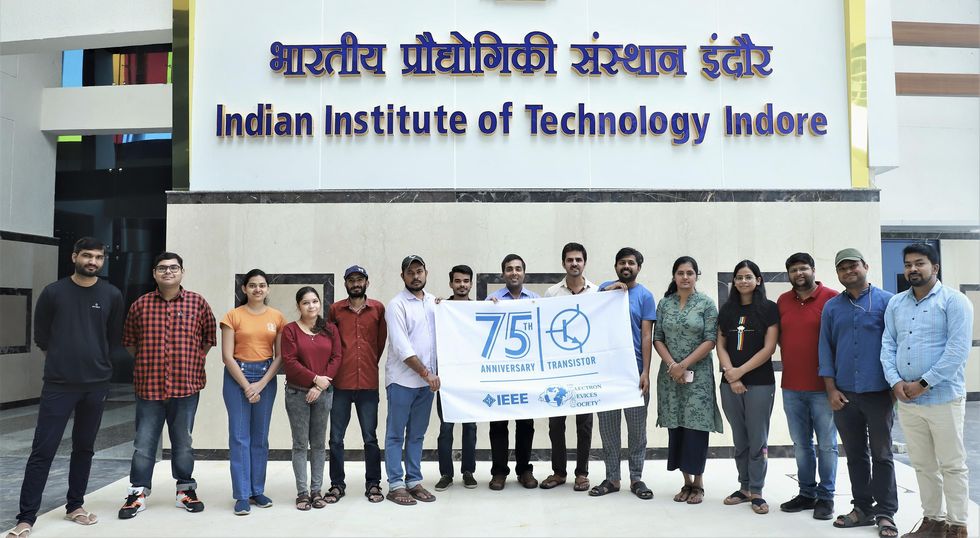Celebrate the 75th Anniversary of the Transistor With IEEE

The transistor, the basic building block of the electronics industry, was developed in 1947 by John Bardeen, Walter Brattain, and William Shockley at Bell Labs in Murray Hill, N.J., to replace the vacuum tube. The three honorary IEEE members received the 1956 Nobel Prize in physics for their work.
To mark the transistor's 75th anniversary, the IEEE Electron Devices Society is holding seminars and panel discussions at IEEE conferences, as well as presenting webinars, giving away prizes, and organizing other events from now until the end of next year.
These events are being done at each conference to remind the community how important the mighty transistor has been over the past 75 years," says IEEE Fellow Ravi Todi, the EDS president.
Todi says he is particularly excited about the celebrations scheduled for this year's IEEE International Electron Devices Meeting, the society's flagship conference, being held from 3 to 7 December at the Hilton San Francisco Union Square. The conference has been bringing together engineers from academia and industry for more than 70 years.
About the IEEE Electron Devices SocietyEDS was established in 1952 as a committee of the Institute of Radio Engineers, one of IEEE's predecessor societies. After IRE's merger in 1963 with the American Institute of Electrical Engineers-which formed IEEE-EDS was an IEEE technical group. It became a society 13 years later.
EDS now has about 9,000 members and 250 chapters worldwide.
We pride ourselves on the fact that a lot of the core inventions of transistors were developed by IEEE EDS members," says Ravi Todi, the society's president.
A lot of the key inventions that have to do with the transistor have been first presented at this conference," Todi says. IEEE IEDM has played a key role in driving the progress of the transistor."
Several society members are compiling a book about the transistor and its history. In addition, technical articles are scheduled to run in IEEE Spectrum and in the EDS Newsletter.
Our aim is to teach and enlighten members on the importance of the transistor," says IEEE Senior Member Manoj Saxena, who is overseeing the anniversary celebrations. The events shall be a tribute to the men and women who have contributed to the development of the transistor, which has had a lasting impact on people's lives and has benefited mankind."
 Members of the IEEE Electron Devices Society's IEEE Madhya Pradesh Section celebrate the transistors 75th anniversary at the Indian Institute of Technology in Indore.IEEE
Members of the IEEE Electron Devices Society's IEEE Madhya Pradesh Section celebrate the transistors 75th anniversary at the Indian Institute of Technology in Indore.IEEE
EDS is collaborating with the IEEE Solid-State Circuits Society to mark the anniversary. Since January, the two societies have been presenting a webinar series on the effect transistors have had on society and technological advances. Every month, a member who works in the field of electron device engineering gives a presentation on a technology impacted by the transistor. Presentations so far have covered 2D semiconductors, chemical sensors, and 5G cellular technology. The talks are available on demand on the EDS website.
EDS is compiling a commemorative book designed to explore the development of the transistor and how it has changed in the past 75 years. Transistor pioneers including Digh Hisamoto, Eric R. Fossum, and Chenming Hu are writing chapters for the book, which is scheduled to be published early next year. Hisamoto, an IEEE Fellow, developed the 3D double-gate metal-oxide-silicon field effect transistor in 1989. Three years later, Fossum, also an IEEE Fellow, invented the CMOS image sensor. An IEEE Medal of Honor recipient and IEEE Life Fellow, Hu is known as the father of the 3D transistor" for inventing the FinFET in 1999.
We want to capture historical accounts of the device's development and growth," Todi says.
IEEE EDS chapters are holding events to celebrate the anniversary. The activities include social gatherings, technical talks, and historical seminars.
To learn more about upcoming events in your area and how to participate, visit the EDS website.